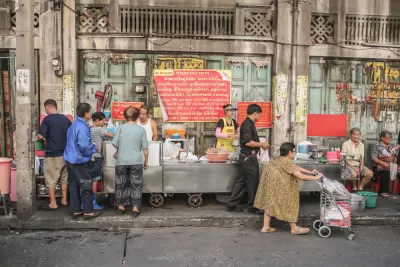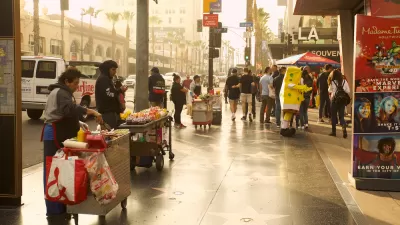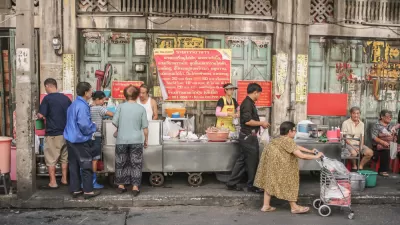Street vending has been a contentious issue in many places, but this part of the informal economy is important to the social and economic well-being of cities.

Sarah Orleans Reed writes about the role of street vending in cities around the world. Street food vendors, for example, offer inexpensive and accessible food in many communities, and street vending is an important source of income and employment for women.
While many cities have cracked down on street vending, often based on the argument that the vendors compete with brick-and-mortar businesses, the evidence shows that they in fact help local economies, says Reed:
In Bangkok, the recent disappearance of street markets badly hurt local storefronts, as well as wholesalers from whom vendors had previously purchased their goods. Businesses in some neighborhoods reported declines of well over half, with many shops relocating and the neighborhoods turning dark, quiet, and more dangerous.
Reed also describes the way Los Angeles and Monrovia, Liberia, have successfully developed policies around street vending, including issuing permits and licenses, collecting taxes and fees, and establishing regulations and enforcement. "L.A. and Monrovia are extremely different in many ways, but they have both made a common, affirmative decision to capitalize on the valuable services that vending provides: creating jobs, increasing access to affordable foods and goods, activating isolated city streets, and stimulating local economies."
Reed’s organization, Women in Informal Employment: Globalizing and Organizing (WIEGO), has also developed a toolkit to help guide local governments through an inclusive planning and policymaking process for street vending.
FULL STORY: Netflix’s ‘Street Food’ Reveals a Thriving and Threatened Culture

Alabama: Trump Terminates Settlements for Black Communities Harmed By Raw Sewage
Trump deemed the landmark civil rights agreement “illegal DEI and environmental justice policy.”

Planetizen Federal Action Tracker
A weekly monitor of how Trump’s orders and actions are impacting planners and planning in America.

Why Should We Subsidize Public Transportation?
Many public transit agencies face financial stress due to rising costs, declining fare revenue, and declining subsidies. Transit advocates must provide a strong business case for increasing public transit funding.

Understanding Road Diets
An explainer from Momentum highlights the advantages of reducing vehicle lanes in favor of more bike, transit, and pedestrian infrastructure.

New California Law Regulates Warehouse Pollution
A new law tightens building and emissions regulations for large distribution warehouses to mitigate air pollution and traffic in surrounding communities.

Phoenix Announces Opening Date for Light Rail Extension
The South Central extension will connect South Phoenix to downtown and other major hubs starting on June 7.
Urban Design for Planners 1: Software Tools
This six-course series explores essential urban design concepts using open source software and equips planners with the tools they need to participate fully in the urban design process.
Planning for Universal Design
Learn the tools for implementing Universal Design in planning regulations.
Caltrans
Smith Gee Studio
Institute for Housing and Urban Development Studies (IHS)
City of Grandview
Harvard GSD Executive Education
Toledo-Lucas County Plan Commissions
Salt Lake City
NYU Wagner Graduate School of Public Service





























